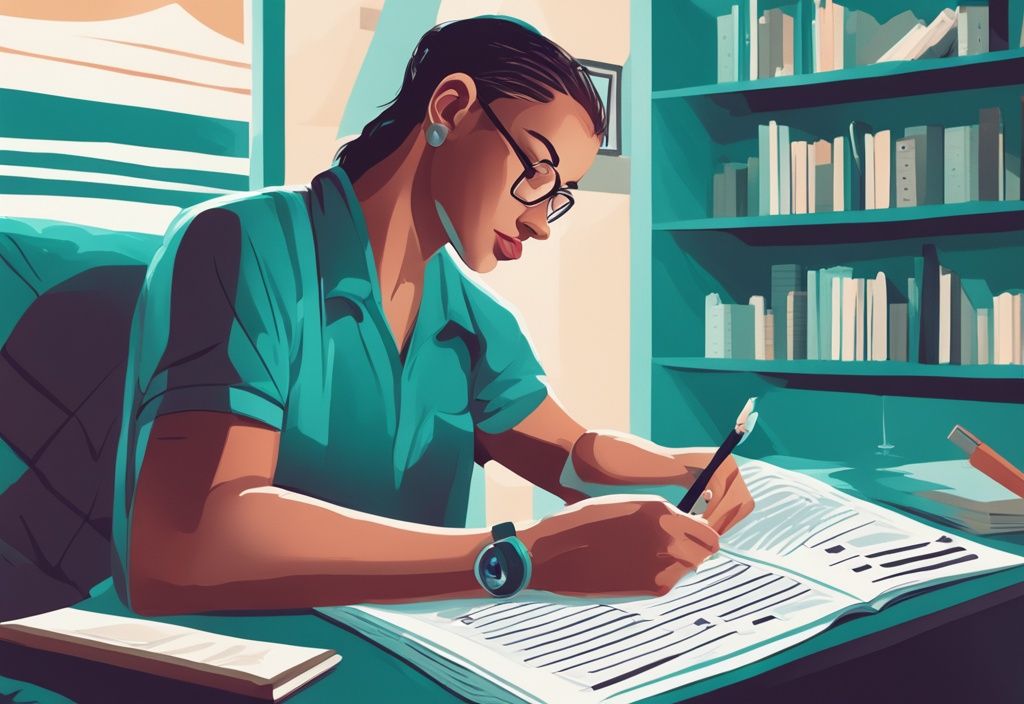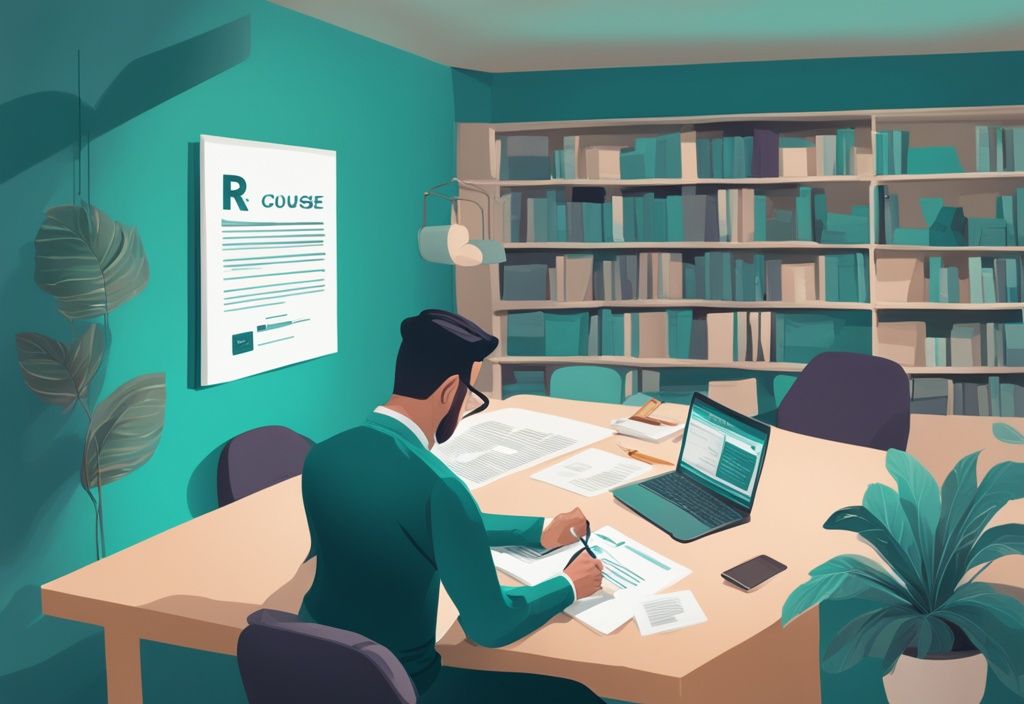Did you know that a real estate career can offer incredible flexibility and financial security? Hey there, I’m Alex Harper and I’m here to guide you on that journey. Getting your real estate license might seem intimidating, but let’s walk it through step by step.
From the perspective of my decade-long real estate experience, I’m about to break down the process of how to get a real estate license into bite-sized nuggets. This comprehensive guide delves deep into meeting key state-specific prerequisites, succeeding in your exam, and even finding your perfect brokerage match.
You’ve clicked here because you’re eager to kick start a rewarding career and I assure you’ll leave feeling more prepared and confident. So, let’s dive in, future real estate professionals!
Step-by-Step Guide to Getting Your Real Estate License
This guide will take you through everything you need to know about the process of getting a real estate license, from meeting basic requirements to understanding the specifics of pre-license education in different states.
Understanding the Basic Requirements
To embark on the journey of obtaining your real estate license, you must first meet some foundational criteria. You need to be at least 18 years old and possess a valid social security number. Additionally, a high school diploma or its equivalent is a must. Another crucial requirement is that you should be either a US citizen or a legal resident.
These prerequisites ensure you’re eligible to move forward with the more specialized requirements specific to each state, setting a solid foundation for your real estate career.
Comprehending the State-Specific Pre-License Education
Getting educated is a critical step in how to get a real estate license, and many aspiring agents find that online real estate schools offer convenient classes that can be taken from the comfort of your home. Each state has its own specific pre-license education hours that applicants must complete. For instance, if you’re in New York, you’ll need to complete 77 hours of approved qualifying education. Conversely, in Massachusetts, a 40-hour course from a state-approved real estate school is required. Missouri sets its requirement at 72 hours of approved pre-license education, while Texas is one of the most stringent, demanding 180 classroom hours. These courses are designed to provide a comprehensive understanding of real estate laws, practices, and ethics, ensuring you’re well-prepared for the licensing exam. Moreover, understanding key concepts such as what a BOV in real estate means can further enhance your knowledge in the field. Whether your state requires fewer hours like Massachusetts or a broader curriculum like Texas, completing these education requirements is essential.
The courses cover vital topics such as real estate laws, financing options, and ethical practices, giving you a solid grounding in the field. Some programs even include practical examples and case studies to help you apply what you’ve learned. Completing these education requirements is a big milestone on your journey to becoming a licensed real estate agent, making you not just knowledgeable but confident and ready to hit the ground running.
Preparing for the Real Estate License Exam
Exam Scheduling: Key Details
Scheduling your real estate license exam is a crucial step on your path to becoming a licensed real estate agent. Each state has its own specific requirements and portals for scheduling the exam. Below, we’ll walk through the steps to ensure a smooth scheduling process, tailored to your state’s unique system.
First, make sure you’ve completed all the state-specific pre-license education requirements. Think of this as your foundational homework, necessary before moving on to the exam itself. Only after you’ve ticked off this requirement should you move forward.
For those in New York, the exam scheduling is done through the eAccessNY portal. Start by creating an account on this site. This account is your gateway to schedule your exam, view important instructions, and later check your results. Having all required documents and information on hand when creating your account can streamline this process.
In Missouri, the process is managed by PSI Testing Centers. Like in New York, creating an account on the PSI platform is essential. This platform not only lets you schedule your exam but also provides vital information about test locations, dates, and times. PSI aims to make the scheduling process as simple and user-friendly as possible, so you can focus on your preparation.
As you proceed with scheduling, be ready to pay all associated fees for the exam and the licensing process. Fees may include application fees, exam fees, and other ancillary costs that your state may require. Typically, these fees range from nominal amounts to several hundred dollars, depending on factors such as location and administrative charges.
To sum it up, here’s your roadmap for scheduling your real estate license exam:
- Complete your state-mandated pre-license education hours.
- Create an account on the required state portal or testing center platform.
- Schedule your exam date and pay all associated fees.
Following these steps ensures that you’re well-prepared and organized, setting you on the right path to successfully getting your real estate license.
Exam Day: Tips and Guidelines
Exam day for your real estate license is a significant milestone. Here’s what you need to know about the exam center protocols and requirements to ensure everything goes smoothly.
What to Expect at the Exam Center
When you arrive at the exam center, the first thing you’ll need is a current government-issued photo ID, such as a state driver’s license or a non-driver ID card. This ID verifies your eligibility, and without it, you won’t be allowed to take the exam. Remember, this step is crucial on your journey on how to get a real estate license.
Be prepared for strict adherence to exam policies. Only certain calculators may be permitted by the testing center, such as specific financial calculators pre-approved by the testing body. However, electronic devices like smartphones, smartwatches, and tablets are strictly off-limits. These rules ensure that everyone has a fair and equal opportunity during the exam.
Keep your personal belongings to a minimum. Large bags and any excessive items must be left outside the exam area. Reference materials, food, drinks, and tobacco products are also prohibited. So, pack light and bring only what’s essential.

Additionally, visitors are not allowed in the examination room. This means no friends, family members, or companions. The goal is to maintain a distraction-free environment so you can focus entirely on acing your exam.
By understanding and following these guidelines, your exam day will be as smooth as possible. Stay prepared and confident—each step brings you closer to obtaining your real estate license.
Decoding Your Real Estate Exam Results
Understanding how to get a real estate license involves decoding your exam results, which typically indicate whether you have passed or failed.
New York
In New York, your exam results are typically available within a few days after completing the test. When you pass, your results are valid for two years, giving you ample time to apply for your real estate license without needing to retake the exam. It’s straightforward to check your results through the eAccessNY portal, the same place where you originally scheduled your exam. Just log into your account to see if you’ve passed and start taking the next steps toward obtaining your license.
Massachusetts
If you’re aiming to become a real estate agent in Massachusetts, you’ll need to score at least 70% on each section of the exam. The test is split into two parts: a national portion and a state-specific portion. You need to pass both to move forward. Luckily, you’ll find out your results right after completing the test at the exam center. This immediate feedback allows you to understand your performance and plan your next steps accordingly.
Missouri
In Missouri, decoding your real estate exam results requires understanding the different passing criteria for the national and state sections. You’ll need to score at least 70% on the national part and 75% on the state-specific part. These benchmarks ensure you’re well-versed in both federal and state real estate laws and practices. Once you pass, the next steps include submitting fingerprints and undergoing a background check. These steps ensure you’re on the right track to getting your real estate license.
How to Apply for Your Real Estate License
Once you’ve successfully passed your real estate exam, the next crucial step is applying for your real estate license. This process involves several key steps and submitting necessary documents to your state’s real estate commission or regulatory body. Below, we break down how to get a real estate license in New York and Missouri.
New York: Applying Through eAccessNY
In New York, applying for a real estate license is a seamless online experience through the eAccessNY portal. Follow these steps to breeze through your application:
- Create an eAccessNY Account: Head over to the eAccessNY website and set up your account. If you already have one, you’re a step ahead!
- Complete Application Form: Fill out the online application with all the necessary details. Accuracy is key—double-check your information to avoid any hiccups.
- Principal Broker Authorization: Get the green light from a licensed principal broker. This step is crucial as it validates your application. By endorsing your application through eAccessNY, the principal broker ensures you meet all qualifications.
- Pay Application Fees: The process includes a fee payable online on the eAccessNY portal. Have your payment details handy to keep things moving smoothly.
- Submit Required Documents: Upload all required documents like proof of completing pre-license education. This step ensures you’ve met all state prerequisites.
Missouri: Background Check and Fingerprinting
In Missouri, getting your real estate license involves some additional steps, including fingerprinting and a criminal background check. Here’s how to navigate it all:
- Complete Pre-License Education: Make sure you’ve completed the required 72 hours of pre-license education. You’ll need proof of this when you submit your application.
- Submit Fingerprints: Schedule your fingerprint appointment through IDEMIA (IdentoGO). This is a mandatory step, enabling the state to conduct a thorough background check.
- Criminal Background Check: Your fingerprints will be used for a criminal background check. Ensure you have no pending criminal cases or convictions that could halt your application.
- Application Submission: Submit your application to the Missouri Real Estate Commission, along with proof of completed education, fingerprint submission, and background check results.
- Pay Fees: Pay the necessary application fees as instructed by the Missouri Real Estate Commission. Keep track of your payment confirmation—it might come in handy later.
By following these steps, you can make the process of getting your real estate license as smooth as possible. Always check the specific requirements and procedures for your state, as they may change over time or have additional stipulations not covered here. Understanding how to get a real estate license requires planning and attention to detail in every phase of the process. Good luck!
Securing a Real Estate Brokerage Sponsorship: Why and How
Understanding why securing a sponsorship from a licensed real estate brokerage is crucial, and knowing how to do it, can significantly impact your journey in getting a real estate license.
Why You Need a Brokerage Sponsorship
To practice as a real estate agent, most states mandate that you must work under the umbrella of a licensed real estate broker. This requirement is in place because:
- Compliance and Legal Oversight: Brokers ensure that their agents comply with state laws and regulations. They provide the necessary legal and ethical guidance that is critical in real estate transactions.
- Training and Mentorship: New agents benefit from the experience and training offered by their brokers. This includes procedural knowledge, market insights, and client handling tips that are crucial for success in real estate.
- Access to Resources: Brokers offer tools and resources such as MLS access, marketing materials, and office space, which are essential for conducting real estate business.
- Reputation and Credibility: Working under a well-known brokerage can enhance your credibility. It helps in building client trust, thereby increasing your chances of successful transactions.

How to Secure a Brokerage Sponsorship
Finding the right brokerage to sponsor you is a crucial step in how to get a real estate license. Here’s how you can go about it:
- Research and Identify: Start by researching various brokerages in your area. Look for firms that have a good reputation, provide robust training programs, and offer support to new agents. Online reviews, industry reports, and word-of-mouth recommendations can be helpful.
- Prepare Your Resume: Even if you are new to real estate, highlighting relevant skills and experiences on your resume can make a difference. Focus on customer service, sales experience, and any related coursework or licenses you might hold.
- Understand Real Estate Terms: Familiarize yourself with industry-specific terms, such as what is T12 in real estate, to enhance your knowledge and communication with professionals in the field.
- Reach Out and Network: Use professional networking events, real estate seminars, and online platforms to connect with potential brokers. Introduce yourself, express your interest in their brokerage, and request informational interviews to learn more about their operations and expectations.
- Interview and Ask Questions: Once you secure an interview, treat it as a two-way street. Ask questions about commission splits, training programs, office culture, support systems, and any other concerns you might have. Ensuring that the brokerage aligns with your career goals is as important as them finding you suitable.
- Show Commitment: Demonstrate your enthusiasm and commitment to the real estate career during your interactions. Brokers are often looking for dedicated individuals who are willing to learn and grow under their guidance.
Sponsorship by a licensed broker is typically required in most states, including New York. Ensuring you choose the right brokerage can set the foundation for a successful and fulfilling career in real estate. Navigating the requirements of how to get a real estate license involves strategic choices and a thorough understanding of the process, with brokerage sponsorship being a key component.
A Guide to Maintaining Your Real Estate License
Navigating the world of real estate means not just earning your license but also keeping it valid and up-to-date. Staying compliant with state regulations through continuing education (CE) is crucial. Every state has its unique requirements to ensure that real estate professionals are well-informed about the latest industry developments and legal standards. Let’s explore the CE requirements for New York and Massachusetts.
The Role of Continuing Education
To ensure your real estate license remains active and valid, completing continuing education (CE) requirements is essential. Each state enforces specific CE mandates, ensuring that real estate professionals remain knowledgeable and up-to-date with industry changes and regulations. Here’s a closer look at the requirements for New York and Massachusetts.
New York:
In New York, real estate licensees must complete their continuing education requirements every two years. This typically involves attending approved courses that cover various aspects of real estate practice, including legal updates, ethics, and other pertinent subjects. These courses are designed to reinforce existing knowledge while introducing new regulations and industry best practices.
Massachusetts:
Massachusetts requires real estate professionals to complete 12 hours of continuing education within a two-year period. The courses must be taken at state-approved real estate schools and often cover core topics like fair housing laws, zoning regulations, and environmental issues. By fulfilling these requirements, agents can ensure they are well-versed in the latest real estate laws and trends.
Continuing education not only ensures compliance with state regulations but also enhances your professional expertise, helping you stay competitive in a dynamic market. By regularly updating your knowledge base, you can provide better service to your clients and maintain a successful real estate career.
Extra Things to Consider When Getting a Real Estate License
Embarking on the journey of how to get a real estate license involves various important considerations. From professional liability insurance to understanding different types of licenses and the benefits of joining real estate associations, there are several key elements that can significantly impact your career in real estate.
Professional Liability Insurance: Do You Need It?
When considering how to get a real estate license, one crucial aspect to explore is professional liability insurance, commonly known as Errors & Omissions (E&O) insurance. Think of this as a safety net that shields you from the financial burden of lawsuits stemming from mistakes or omissions in your professional services. It’s not always mandatory, but E&O insurance is highly recommended. It can cover legal defense costs and potential settlements, protecting you from what could be catastrophic blows to your career and finances.
Understanding Different Types of Real Estate Licenses
Another key element in the process of how to get a real estate license is understanding the different types of licenses available. Each type serves a specific role within the real estate industry and has its own set of requirements:
- Broker Licenses: Brokers are licensed to manage their own real estate businesses and oversee other real estate agents. Typically, obtaining a broker’s license requires additional education, experience, and passing a broker-specific exam.
- Salesperson Licenses: Salespersons, also known as agents, work under the supervision of a licensed broker. To obtain a salesperson license, candidates must meet educational requirements and pass the state licensing exam.
- Associate Broker Licenses: Associate brokers have similar qualifications to brokers but choose to work under the direction of another broker rather than running their own firm. This license often requires a broker’s level of education and experience.
The Advantages of Joining Real Estate Associations
As you embark on the journey of how to get a real estate license, consider the benefits of joining professional real estate associations such as the National Association of REALTORS® (NAR). Membership in these associations offers several advantages:
- Resources: Gain access to comprehensive resources, including industry research, best practices, and continuing education programs that can enhance your professional know-how and skills.
- Networking Opportunities: Connect with other professionals in the industry through events, conferences, and online communities, facilitating valuable business relationships and support networks.
- Industry Events: Participate in exclusive events and workshops that provide insights into market trends, regulatory changes, and innovations in the real estate sector.
Joining a real estate association not only boosts your credentials but also enriches your career by keeping you informed and connected within the professional community.
Reciprocity and Accessibility in Real Estate Licensing
Navigating the path of how to get a real estate license can be overwhelming, but understanding the concepts of special testing arrangements and license reciprocity can make the journey smoother. Let’s break these down into more digestible pieces:

What is Special Testing?
Special testing arrangements cater to individuals with disabilities or specific needs, ensuring everyone has a fair shot at obtaining a real estate license. Imagine needing more time on an exam or a quieter room to concentrate—special testing covers these needs. It might include:
- Extended time
- Separate testing rooms
- Provision of special equipment
To arrange for special testing, reach out to your state authorities well in advance. For instance, if you’re in New York, you would contact the New York State Department at 518-474-4429. Keep in mind that you might need to provide proper documentation to qualify for these accommodations.
Reciprocity: Making Your License Work Nationwide
License reciprocity can be a real game-changer, allowing you to practice real estate in multiple states without going through the complete licensing process each time. This becomes especially handy if you’re wondering how to get a real estate license while planning to work across different regions.
Take Missouri, for example—it offers full license reciprocity with all 50 states, making it particularly beneficial for mobile real estate pros. However, it’s key to remember that out-of-state licensees might need to tackle additional steps like:
- Passing a state-specific exam
- Fulfilling extra education hours
Always touch base with the real estate regulatory body in the state where you plan to work. This will give you a clear picture of the specific reciprocity agreements and requirements you need to meet. Following these guidelines can save you a lot of time and help you maintain your focus on what you do best: real estate.
Conclusion: The Final Steps to Your Real Estate License
Securing your real estate license is a significant achievement, marking the beginning of an exciting career. However, to ensure a smooth transition from licensing to practicing, you must diligently follow the final steps required by your state:
Ensure All Application Requirements and State Conditions Are Met
After passing your real estate exam, it’s time to tackle the essential paperwork. Submitting your application to your state’s real estate commission or regulatory body involves several steps. Each state has its own unique set of requirements, like proof of educational completion, exam results, and possibly even fingerprinting. Double-check those documents for accuracy to avoid any delays or rejections. Think of it like assembling a puzzle; missing pieces can halt your progress.
Secure Sponsorship from a Licensed Brokerage
In most states, having a licensed brokerage sponsor you is crucial. A licensed broker needs to oversee new agents as they start their practice. Begin by contacting local brokers in the areas where you’re interested in working. Be prepared to showcase your commitment and understanding of the real estate industry. Building this relationship early can provide invaluable guidance and networking opportunities. It’s like having a mentor who helps you navigate the initial hurdles of your career.
Continue Education to Keep the License Active
Obtaining your real estate license is just the starting point. Maintaining it involves meeting your state’s continuing education requirements. These requirements are designed to keep you updated on the ever-evolving real estate laws and best practices. For instance, in New York, you need to complete continuing education every two years. Staying on top of these requirements is essential to avoid lapses in licensing and to keep your career on track. Think of it as ongoing training in your favorite sport; it keeps you sharp and ready for the game.
By adhering to these steps, you can effectively navigate the final stages of how to get a real estate license and embark on your journey as a real estate professional. Each detail counts, and staying organized and informed will help you transition smoothly into your new role.
Frequently Asked Queries: Getting a Real Estate License
What are the Requirements for a Real Estate License?
To get a real estate license, you need to meet some basic requirements. Firstly, you need to be at least 18 years old. A valid social security number is essential. You also need to have a high school diploma or an equivalent qualification. Additionally, you must be a US citizen or a legal resident.
How to Prepare for the Real Estate License Exam?
The journey to getting a real estate license begins with completing the state-specific pre-license education requirements. Each state has its own mandated hours of education that you must fulfill. Once you have completed the education, it’s crucial to study both the national and state-specific materials thoroughly to be well-prepared.
Next, schedule your exam through your state’s specific portal and then take the exam.
What are the Associated Costs for Licensing?
When considering the full scope of getting a real estate license, it’s important to budget for the associated costs. Application fees can range between $65 to $150, depending on your state. Exam fees typically fall between $10 to $54. Additionally, the cost of pre-license education can vary significantly, generally ranging from $229 to $800.
Essential Things to Bring to the Real Estate Exam
Knowing what to bring on exam day is a key part of understanding how to get a real estate license. A government-issued photo ID, such as a driver’s license, is mandatory. Depending on the site policies, a permitted calculator can also be brought to assist with calculations. If applicable, don’t forget your examination admission letter, which confirms your registration and eligibility.
Applying for Real Estate License: Procedure and Documents Required
The application process is another crucial step in getting a real estate license. Submitting an online application through state-specific portals, such as eAccessNY for New York, is essential. In many states, you will also need to provide fingerprints and undergo a background check, ensuring all legal requirements are fulfilled.
Passing Score for the Real Estate License Exam: What You Should Aim For
Understanding the required passing scores is crucial to getting a real estate license. Each state has set benchmarks. For example, in New York, you need to meet the specific state cut-off for passing. In Massachusetts, you must score at least 70% on each section. For Missouri, a 70% score is required on the national section and 75% on the state-specific section.
This detailed breakdown helps illuminate the steps for getting a real estate license, providing a clear and structured path to follow for anyone interested in entering the real estate field.
Hi, I’m Alex Harper, a real estate expert with over ten years of experience in property management and legal advice. My passion is making the often complicated world of real estate understandable. I share practical tips and simple solutions to help you make better decisions – whether you’re buying a home, renting or just want to learn more about the industry. With my knowledge and experience, I want you to feel well-informed and confident in your real estate projects. Let’s tackle this together!




